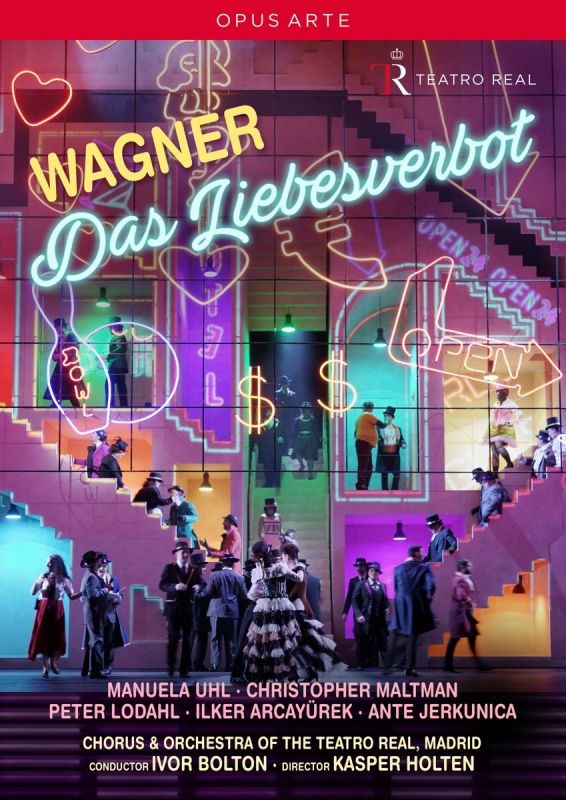WAGNER Das Liebesverbot
View record and artist detailsRecord and Artist Details
Composer or Director: Richard Wagner
Genre:
Opera
Label: Opus Arte
Magazine Review Date: 04/2017
Media Format: Digital Versatile Disc
Media Runtime: 160
Mastering:
DDD
Catalogue Number: OA1191D

Tracks:
| Composition | Artist Credit |
|---|---|
| (Das) Liebesverbot |
Richard Wagner, Composer
Ante Jerkunica, Brighella, Bass Christopher Maltman, Friedrich, Baritone David Alegret, Antonio, Tenor David Jerusalem, Angelo, Bass Francisco Vas, Pontius Pilate, Tenor Ilker Arcayürek, Claudio, Tenor Isaac Galán, Danieli, Baritone Ivor Bolton, Conductor Madrid Teatro Real Chorus Madrid Teatro Real Orchestra Manuela Uhl, Isabella, Soprano Maria Hinojosa Montenegro, Dorella, Soprano María Miró, Mariana, Soprano Peter Lodahl, Luzio, Tenor Richard Wagner, Composer |
Author: Mike Ashman
The cast, led by Christopher Maltman’s Friedrich (Wagner’s version of the hypocritical regent Angelo) and Manuela Uhl’s Isabella, go to with more than a will, although Uhl’s encompassing of the part’s ferociously wide tessitura is less confident than reviews of last year’s Madrid opening suggested. The Luzio and Claudio tenors – more awkward to cast because of Wagner’s uneven vocal writing – present clear personalities but sometimes struggle with their music. Bolton conducts with enthusiasm. Like Downes he plays the ruling influence of each musical section for all its worth – the chorus music and the scenes with Luzio, Brighella and Dorella are unapologetically Italian, the nunnery duet for Isabella/Mariana wholly Weber-like; whereas the Sawallisch and Weigle recordings boil down Wagner’s borrowings into a kind of pre-mature Wagner style which lessens the score’s eccentricity and colour.
There’s obvious value in being able to access a performance of this relatively unexplored work on screen for the first time (officially). Yet director Kasper Holten has decided from the word go – an animated projection of Wagner’s head makes faces during the playing of the overture – that this is a comic opera through and through. He gets Maltman to play Friedrich – surely a more dangerous character – in the style of past British artists essaying Beckmesser (and has designer Steffen Aarfing present a flat wall-plus-projections 1970s musical set to go with that). No opportunity for a laugh is passed up – the teddy bear Friedrich agonises with in bed when there is no assignation message from Isabella or the judge’s gavel which either loses its head or becomes an accidental phallic worry bead. The result, while well-worked, takes away a dimension from Wagner’s opera. The revolt to ensure free love (which the chorus and Isabella celebrate at the end) needs a genuine opposition, which is not much enhanced by having the returning King played by a male actor with an Angela Merkel face mask.
Discover the world's largest classical music catalogue with Presto Music.

Gramophone Digital Club
- Digital Edition
- Digital Archive
- Reviews Database
- Full website access
From £8.75 / month
Subscribe
Gramophone Full Club
- Print Edition
- Digital Edition
- Digital Archive
- Reviews Database
- Full website access
From £11.00 / month
Subscribe
If you are a library, university or other organisation that would be interested in an institutional subscription to Gramophone please click here for further information.




